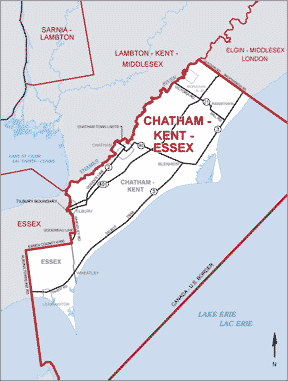In this model, Chatham-Kent-Essex would remain a single-member riding.

In this model, Chatham-Kent-Essex would remain a single-member riding. |
 |
|---|
| Chatham-Kent-Essex - Actual results Ontario provincial election 2003 | |||||||
|---|---|---|---|---|---|---|---|
| Liberal | Progressive Conservative | NDP | Green | Family | Other | Total | |
| Votes received | 23,022 | 11,586 | 2,893 | 1,069 | 0 | 281 | 38,851 |
| Seats won | 1 | 0 | 0 | 0 | 0 | 0 | 1 |
| Seat % | 100% | 0% | 0% | 0% | 0% | 0% | 100% |
| Vote % | 59.26% | 29.82% | 7.45% | 2.75% | 0.00% | 0.72% | 100% |
| Distortion | +40.74 | -29.82 | -7.45 | -2.75 | 0.00 | -0.72 | 40.74 |
In the 2003 Ontario provincial election, the riding elected a Liberal MPP.
Under the existing voting system, 59.26% of the voters got the representative they voted for.
The other 40.74% of the votes were wasted.
In our model, we assume that the Liberal would still have won the riding.
Under this model, 59.26% of the voters in Chatham-Kent-Essex would still have gotten the local representative they voted for.
However, another 40.02% of the voters would know that their vote had helped to elect provincial list members, so they too would have representation.
Only 0.72% of the votes cast would not have helped to elect an MPP, and therefore would have been wasted.
| Simulated compensatory list seats - Ontario provincial election 2003 | |||||
|---|---|---|---|---|---|
| Liberal | Progressive Conservative | NDP | Green | Family | Total |
| 6 | 8 | 2 | 4 | 1 | 21 |
| Chatham-Kent-Essex - Actual results Canadian federal election 2000 | |||||||
|---|---|---|---|---|---|---|---|
| Liberal | Canadian Alliance | Progressive Conservative | NDP | Green | Other | Total | |
| Votes received | 20,085 | 12,957 | 4,156 | 2,209 | 715 | 286 | 40,408 |
| Seats won | 1 | 0 | 0 | 0 | 0 | 0 | 1 |
| Seat % | 100% | 0% | 0% | 0% | 0% | 0% | 100% |
| Vote % | 49.71% | 32.07% | 10.29% | 5.47% | 1.77% | 0.71% | 100% |
| Distortion | +50.29 | -32.07 | -10.29 | -5.47 | -1.77 | -0.71 | 50.29 |
In the 2000 Canadian federal election, the riding elected a Liberal MP.
Under the existing voting system, 49.71% of the voters got the representative they voted for.
The other 50.29% of the votes were wasted.
In our model, we assume that the Liberal would still have won the riding.
Under this model, 49.71% of the voters in Chatham-Kent-Essex would still have gotten the local representative they voted for.
However, another 49.58% of the voters would know that their vote had helped to elect provincial list members, so they too would have representation.
Only 0.71% of the votes cast would not have helped to elect an MP, and would therefore have been wasted.
| Simulated Ontario compensatory list seats - Canadian federal election 2000 | |||||
|---|---|---|---|---|---|
| Liberal | Canadian Alliance | Progressive Conservative | NDP | Green | Total |
| 0 | 9 | 6 | 5 | 1 | 21 |